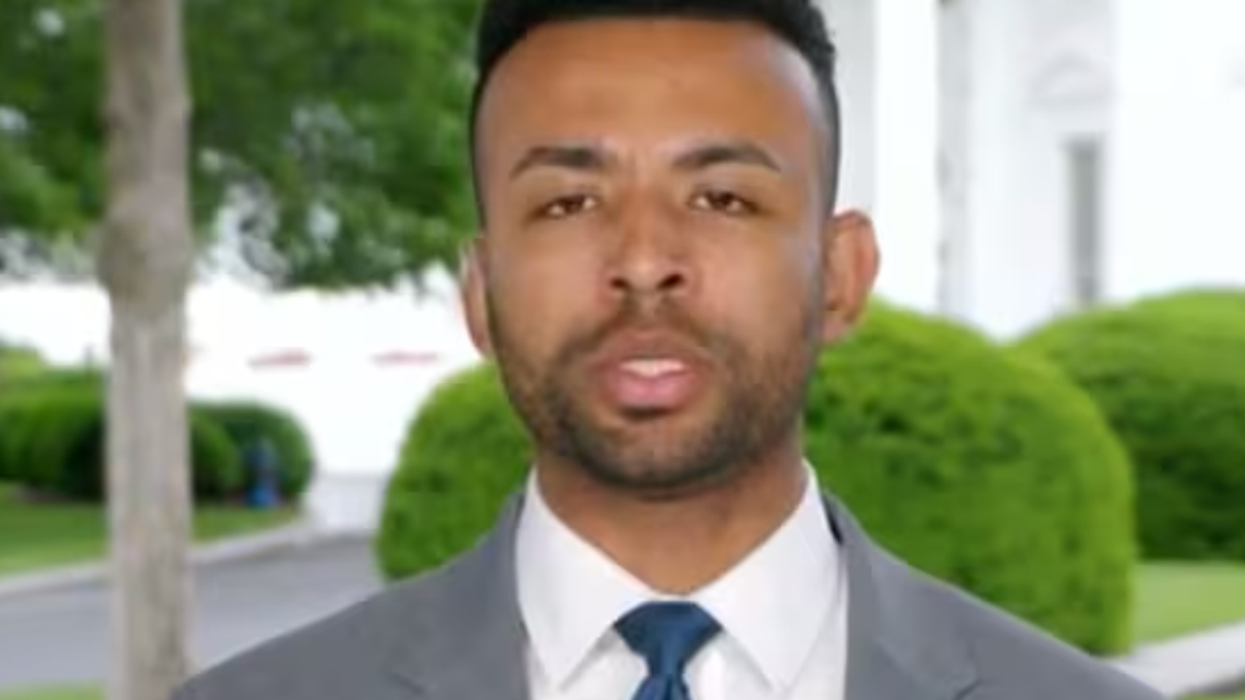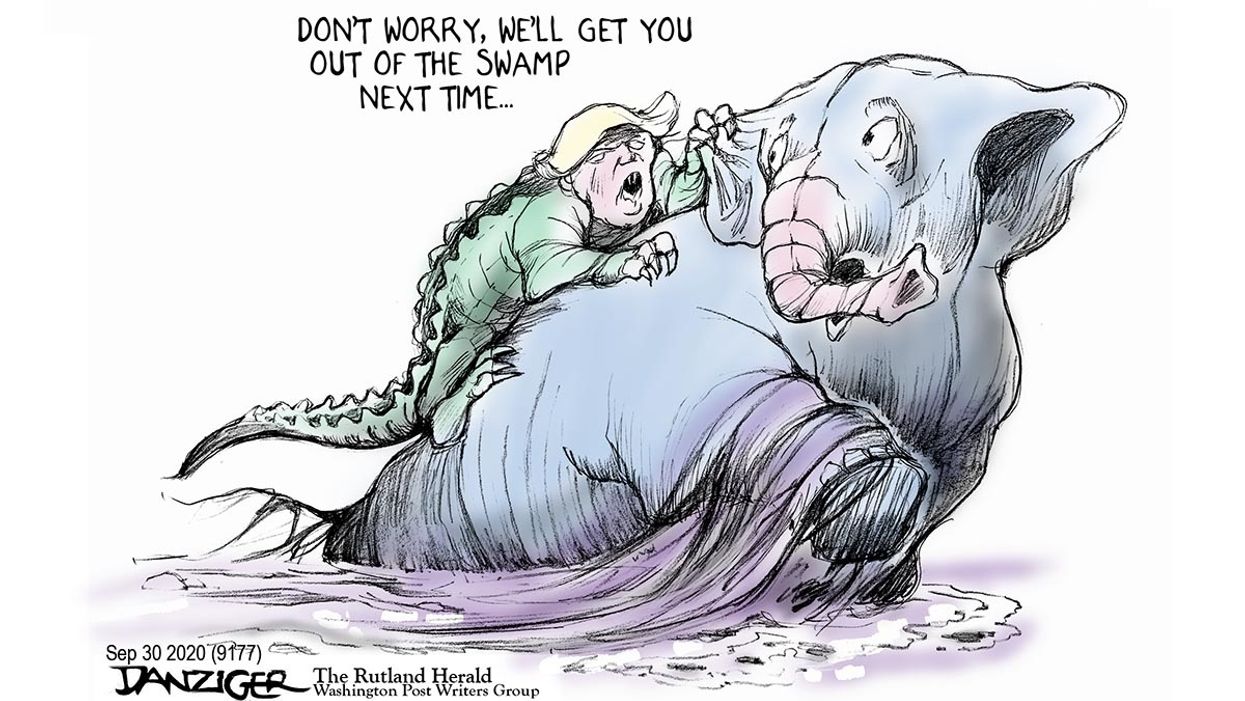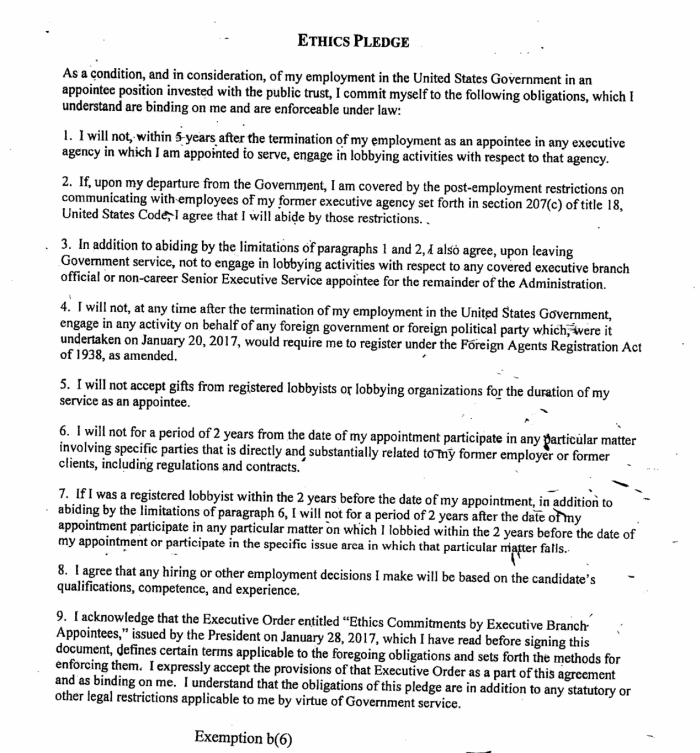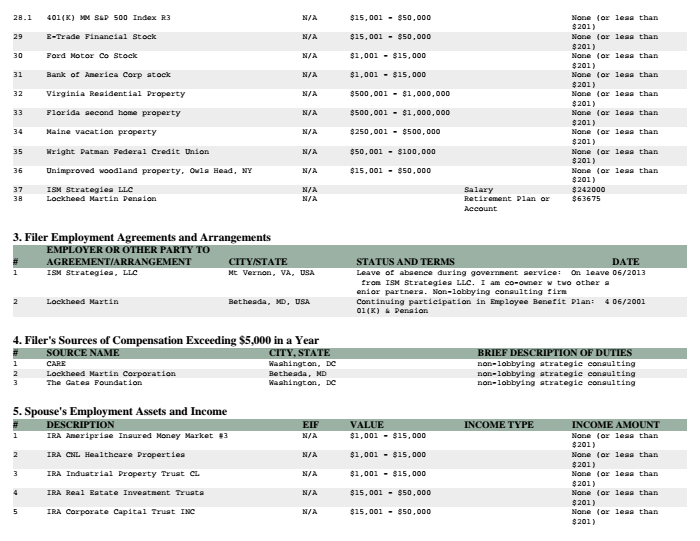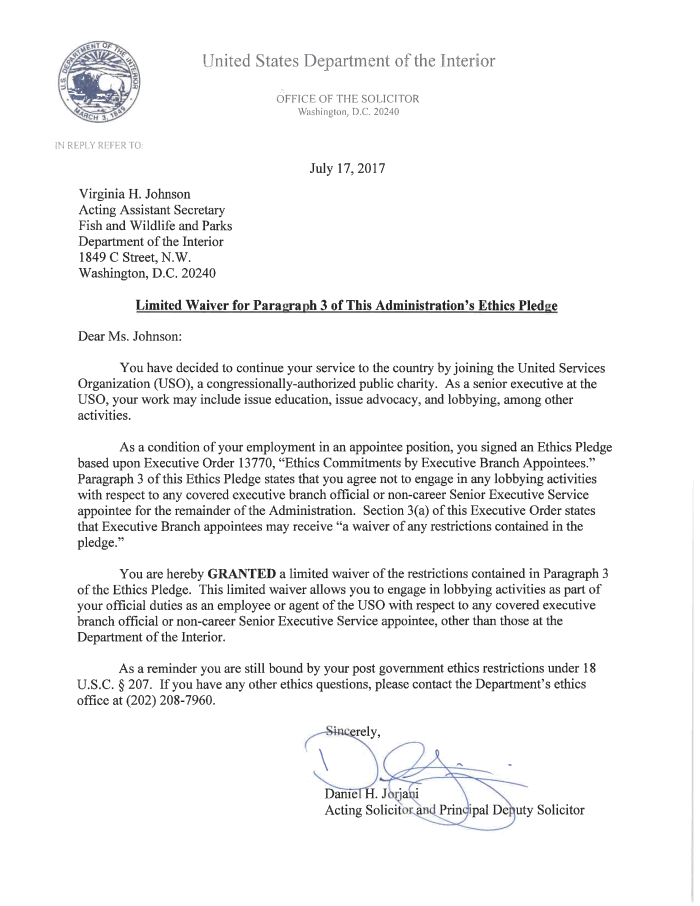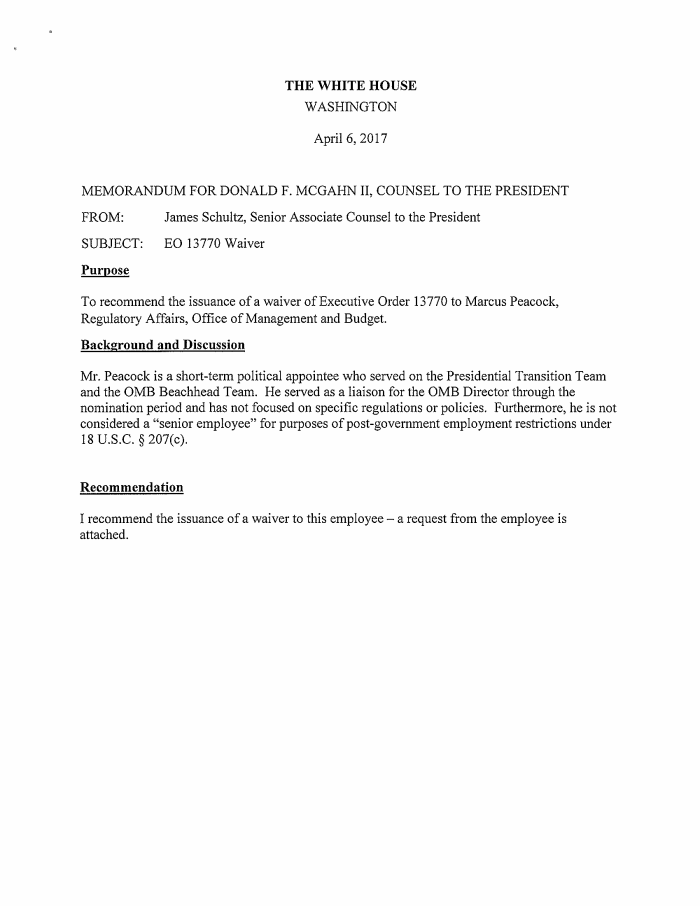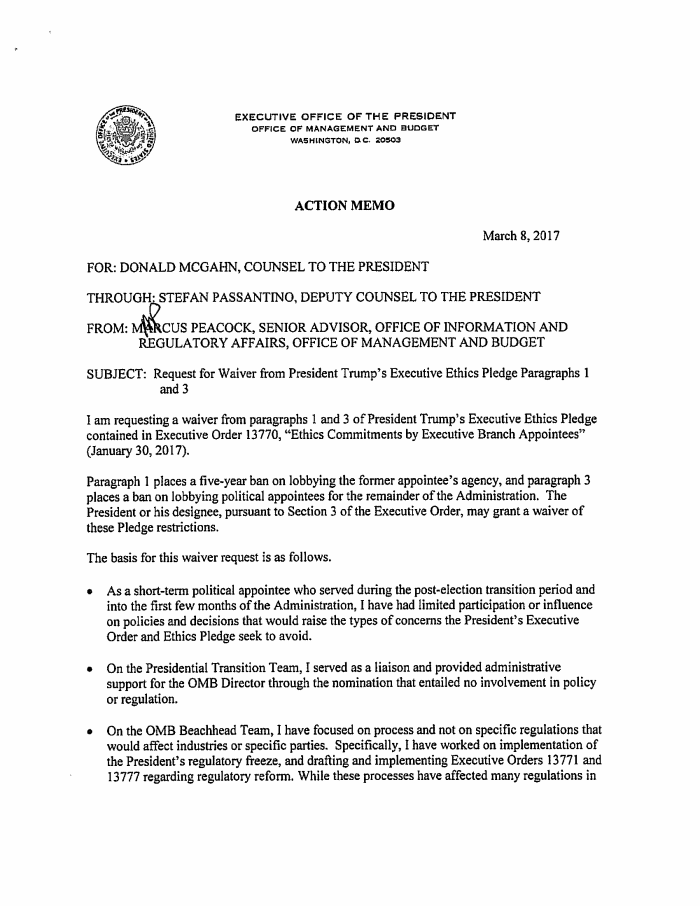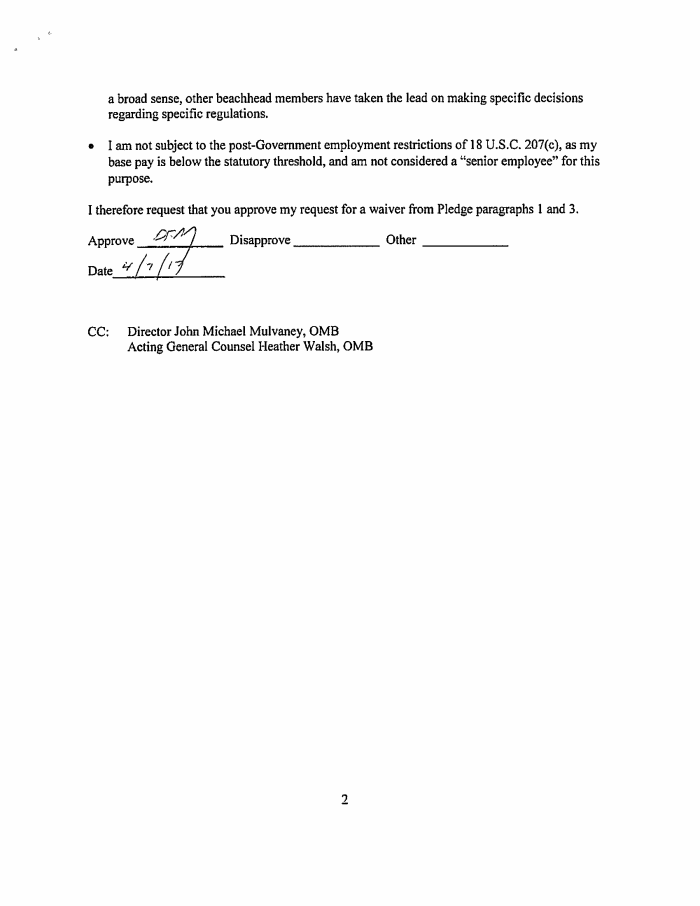A month before he left the Trump administration, Peacock requested an ethics waiver, arguing that he had “limited participation or influence on policies and decisions that would raise the types of concerns” the pledge seeks to avoid, according to a memo he sent to White House attorneys. Because his work on the executive order dealt with “process questions,” Peacock argued, it was not a specific policy action.
On April 6, 2017, two days before Peacock resigned, he received a special waiver. James Schultz, a senior associate counsel in the White House, concluded that Peacock had not “focused on specific regulations or policies.” Peacock left to become the executive vice president, the No. 2 position, at the Business Roundtable, a lobbying group for chief executives at U.S. companies.
The waiver reduced Peacock’s lobbying ban from five years to just six months. According to Senate lobbying records, Peacock is working with colleagues on federal budget process reforms, workforce development and immigration, international trade and changes to the 2010 Dodd-Frank Wall Street overhaul, among other things.
In response to questions, the Business Roundtable noted that Peacock served at OMB for just 77 days and that he voluntarily agreed not to have any lobbying contact with OMB for six months, “more than twice the amount of time he actually worked there.”
Peacock’s waiver has drawn the attention of officials with the Office of Government Ethics, who are reviewing waivers granted by the Trump administration. But the Business Roundtable says it has not been asked about Peacock’s waiver or lobbying.
Route Three: Find The Loopholes
Several Trump political appointees who signed the ethics pledge are working around the rules. Rather than lobbying political appointees at federal agencies, which is prohibited, they’re lobbying congressional leaders on Capitol Hill, which is permitted. Their colleagues can then target the White House, federal agencies and political appointees.
That approach is perfectly legal and common at K Street firms, but lobbying experts said it’s a way to get around restrictions. “Legally, we’re going to separate the executive and the legislative branches, but in reality there’s going to be overlap on shared goals,” said Timothy LaPira, an associate professor of political science at James Madison University who researches lobbying.

Christopher Shank, a former special assistant and senior adviser to Defense Secretary Jim Mattis, worked in the Trump administration until May 2017 and then joined lobbying firm Van Scoyoc Associates. According to lobbying records, Shank is working on “nuclear related issues” and “space products and services,” including possible budget items for his old employer, the Defense Department. One of his clients, NanoRacks LLC, has government contracts to send payloads and small satellites to the International Space Station.
But Shank is directly lobbying only legislators and staffers within the U.S. Senate and House, not former colleagues within federal agencies, and is complying with all post-government employment restrictions, according to Ross Kyle, a spokesman for Van Scoyoc Associates. Shank’s co-worker lobbies federal agencies.
Jordan Stoick worked as a senior adviser for the Treasury Department from April through December 2017. He left to take a job as the lead lobbyist at the National Association of Manufacturing, a trade group that regularly weighs in on immigration reform and labor issues.

Stoick is now a registered lobbyist working on everything from agriculture legislation to coal exports and oil and gas pipelines with congressional leaders and staffers. Other members of his team direct their efforts at federal agencies and the White House. “Jordan is fully meeting his obligations under the ethics agreement he signed with the administration,” said Michael Short, a spokesman for the manufacturing group. (Short himself is a former Trump political appointee, having worked in the White House as a senior assistant press secretary.)
Nathan Bult, who worked as a special assistant in the Department of Health and Human Services from March through December 2017, is now working with Bethany Christian Services in Washington, to advocate on refugee admissions programs at the State Department and other agencies.
Both Health and Human Services and Bethany Christian Services said Bult signed the Trump ethics pledge but that even without a waiver, he was still able to lobby Congress and career staffers at agencies other than HHS.
Bult, who became Bethany Christian Services’ director of government affairs in January, declined to comment.
Route Four: Don’t Sign The Pledge in the First Place
Several short-lived Trump political appointees, including former national security adviser Michael Flynn and Housing and Urban Development senior adviser Shermichael Singleton, have publicly said they didn’t sign the ethics pledge during their stints in government service. In theory, that should have disqualified them, but enforcement, it appears, was less than universal.
At least one of these non-signers has gone back into lobbying with no repercussions. Robert Wasinger served as a White House liaison with the State Department for 25 days. He told ProPublica he never signed the pledge and was never asked to sign one.

Wasinger left to become a senior vice president of federal public affairs at McGuireWoods Consulting and has a client list that includes Amazon, the American Petroleum Institute, Quest Diagnostics Inc., and Verizon. Lobbying records also show that he’s been involved in lobbying on behalf of the families of State Department employees killed during attacks on U.S. embassies in Kenya and Tanzania in 1998. The State Department did not respond to ProPublica’s requests for comment.
Do you know something about the Trump ethics pledge or political appointees who are now lobbying? Send us an email at trump@propublica.org or send a Signal message to 347-244-2134.
Jeremy B. Merrill and Al Shaw contributed to this report.
Derek Kravitz is the research editor at ProPublica and covers the Trump administration.

